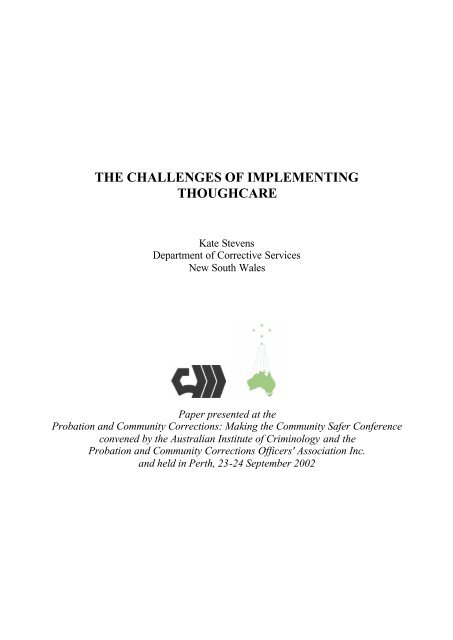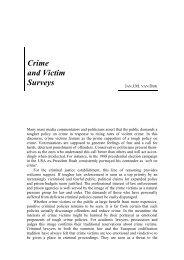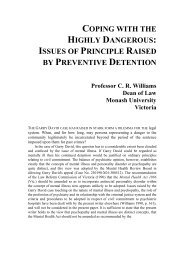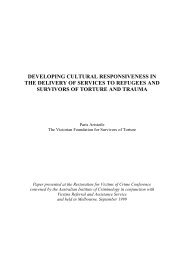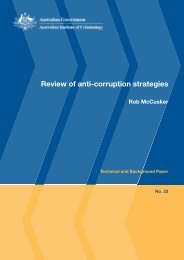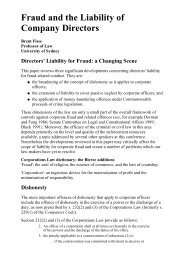The challenges of implementing Throughcare - Australian Institute of ...
The challenges of implementing Throughcare - Australian Institute of ...
The challenges of implementing Throughcare - Australian Institute of ...
Create successful ePaper yourself
Turn your PDF publications into a flip-book with our unique Google optimized e-Paper software.
THE CHALLENGES OF IMPLEMENTING<br />
THOUGHCARE<br />
Kate Stevens<br />
Department <strong>of</strong> Corrective Services<br />
New South Wales<br />
Paper presented at the<br />
Probation and Community Corrections: Making the Community Safer Conference<br />
convened by the <strong>Australian</strong> <strong>Institute</strong> <strong>of</strong> Criminology and the<br />
Probation and Community Corrections Officers' Association Inc.<br />
and held in Perth, 23-24 September 2002
Introduction<br />
It was with keen excitement and enthusiasm but also with a dash <strong>of</strong> trepidation that I took on the<br />
position Project Director for <strong>Throughcare</strong> Strategies in the NSW Department <strong>of</strong> Corrective Services<br />
in June last year. Since then I have had some pretty sobering reality checks so now I would describe<br />
my attitude as one <strong>of</strong> realistic optimism and I am enjoying the opportunity today to share with you<br />
some <strong>of</strong> the experiences I have had in trying to put <strong>Throughcare</strong> on the map <strong>of</strong> the Department <strong>of</strong><br />
Corrective Services. So let me just briefly set the context for you.<br />
Departmental Context<br />
My Department in New South Wales is responsible for the management <strong>of</strong> correctional centre<br />
inmates and <strong>of</strong>fenders in the community supervised by <strong>of</strong>ficers <strong>of</strong> the Probation and Parole Service.<br />
<strong>The</strong>re are 27 gaols housing nearly 8,000 inmates (about 500 <strong>of</strong> whom are women) and there are 66<br />
Probation and Parole district <strong>of</strong>fices managing 18,000 <strong>of</strong>fenders on community based orders. <strong>The</strong>re<br />
are approximately 6000 <strong>of</strong> us who are employed by the Department and this number includes about<br />
500 staff in Probation and Parole.<br />
In line with international trends, one <strong>of</strong> my Department’s core corporate objectives is to apply<br />
effective measures to reduce the rate <strong>of</strong> re-<strong>of</strong>fending. In the case <strong>of</strong> our Department, <strong>Throughcare</strong> is<br />
the primary strategy to positively impact on recidivism.<br />
Definition<br />
I should say up front that although throughcare is ‘new’ in terms <strong>of</strong> <strong>of</strong>ficial strategy, it is certainly<br />
not ‘new’ in terms <strong>of</strong> many <strong>of</strong> the every day work practices carried out by a large number <strong>of</strong> our<br />
colleagues. But it becomes a bit challenging though when such established work practices are to be<br />
articulated into formal departmental policy. I felt that a formal departmental definition <strong>of</strong><br />
throughcare was needed to inform our own staff about what it actually is and how they fit into the<br />
throughcare concept. In this sense it is not only the definition itself which is important but the<br />
discussions surrounding it are also crucial. <strong>The</strong> definition then can also be used to inform other<br />
departments and agencies who work with people in the criminal justice system about what my<br />
Department is trying to achieve.<br />
Let me give you just one example <strong>of</strong> the difficulties we ran into in defining the complex<br />
departmental concept <strong>of</strong> <strong>Throughcare</strong> in one all encompassing but short and to the point sentence:<br />
if the focus <strong>of</strong> throughcare is to provide support to avoid re-<strong>of</strong>fending, who are the people who need<br />
this support?<br />
Clients, inmates, <strong>of</strong>fenders, ex-<strong>of</strong>fenders - this is not being obsessed with semantics! If we don’t<br />
know whom we are talking about within what context, we certainly don’t know how to provide<br />
appropriate services and support.<br />
Well, the definition we have come up with goes like this:<br />
<strong>Throughcare</strong> is the co-ordinated and integrated approach to the management <strong>of</strong> people who are the<br />
responsibility <strong>of</strong> Corrective Services from their first point <strong>of</strong> contact with the Department to the<br />
completion <strong>of</strong> their legal order, including their re-integration into the community.<br />
You will not be surprised to hear that this definition is still a work in progress and if you have any<br />
comments, suggestions and ideas about how this definition can be expanded and/or improved, we<br />
can maybe discuss this over a conference break.<br />
2
It became clear to me early in my position that staff are embracing the concept <strong>of</strong> throughcare with<br />
enthusiasm, albeit cautiously mainly because <strong>of</strong> the need for far reaching change and resource<br />
implications. Despite the fact that much ‘throughcare’ already occurs, if the central objectives as<br />
outlined in this definition are to be achieved, a significant change in the way the Department carries<br />
out its business still needs to occur. For example, meaningful and timely sharing and exchange <strong>of</strong><br />
information across the department itself are essential and everyone involved in the management <strong>of</strong><br />
<strong>of</strong>fenders must be quite clear about their responsibilities either as a giver or receiver <strong>of</strong> information.<br />
Resources<br />
So here I was 12 months ago all dressed up and ready, spending a lot <strong>of</strong> time talking about<br />
<strong>Throughcare</strong> with different groups <strong>of</strong> staff in different forums in community <strong>of</strong>fices and<br />
correctional centres and all sorts <strong>of</strong> pr<strong>of</strong>essional groups. I look around and I am all alone. You know<br />
the story, resources are not exactly plentiful. But I have been successful in drawing on personnel<br />
resources from other sections <strong>of</strong> the Department by cajoling and wheedling colleagues and roping<br />
them into giving me all kinds <strong>of</strong> different supports - and it worked. As such I have become a living<br />
monument to effective throughcare stretching across all sections, branches and units <strong>of</strong> the<br />
department.<br />
But seriously, there was a need to be clear about the parameters <strong>of</strong> my role and project to make<br />
them both manageable and realistic. For example, the whole issue <strong>of</strong> throughcare reaching into<br />
community support for a person after the completion <strong>of</strong> an order is important but not my highest<br />
priority at the moment. While we are working on partnerships with the community sector and other<br />
Government Departments, our main focus for the time being is on bringing our own house in order<br />
as far as throughcare is concerned. This means that <strong>of</strong>ficers working in correctional centres (ie<br />
custodial staff, non custodial staff including centre based Probation and Parole Officers), Probation<br />
and Parole Officers in the community, head <strong>of</strong>fice staff and corrections health staff work together in<br />
a co-ordinated and meaningful way to ensure the provision <strong>of</strong> seamless service and complementary<br />
programs.<br />
I am pleased to say that recently new positions have been created and we will be able in the very<br />
near future to employ several new staff for the throughcare and electronic case management team.<br />
By the way, the further development and expansion <strong>of</strong> an electronic case management system<br />
which allows the recording and sharing <strong>of</strong> assessments, case notes and case plans electronically<br />
across the Department will provide the infrastructure to implement <strong>Throughcare</strong>. NSW Treasury<br />
has provided 7.25 million dollars over three years for this project. I can’t wait to have a team to<br />
work with.<br />
Workshops<br />
A series <strong>of</strong> workshops which I held over the last 9 months, turned out to be an exceptionally<br />
effective strategy to reach a great number <strong>of</strong> our staff. Now who do you think we invited to these<br />
workshops?<br />
<strong>The</strong> participants should come from the different sections rather than just from one <strong>of</strong> the<br />
pr<strong>of</strong>essional groups.<br />
Well, you would think so ... well, we didn’t. <strong>The</strong> first workshop we held included only Probation<br />
and Parole staff - about 65 - but I should say in my defence that it was organised as the result <strong>of</strong> a<br />
specific request from a couple <strong>of</strong> the district managers <strong>of</strong> the central coast Probation and Parole<br />
district <strong>of</strong>fices. <strong>The</strong> feedback from the participants in this workshop in one voice was: “where were<br />
the non probation and parole staff working in correctional centres, how could <strong>Throughcare</strong> work<br />
without them?” And really that is the crux <strong>of</strong> the matter.<br />
3
<strong>The</strong> next workshops were held differently and included always staff from all sections <strong>of</strong> the<br />
department. Unfortunately none <strong>of</strong> them have included staff <strong>of</strong> Corrections Health Service yet but<br />
we are working on this.<br />
<strong>The</strong> workshops provide participants with the conceptual framework <strong>of</strong> <strong>Throughcare</strong>, opportunities<br />
to discuss it and relate it to their individual work roles. <strong>The</strong>y also provide a chance to identify<br />
specific issues in particular local work areas and to discuss them in the context <strong>of</strong> translating the<br />
theory <strong>of</strong> <strong>Throughcare</strong> into practice, and suggesting ways to improve working relationships for the<br />
benefit <strong>of</strong> <strong>Throughcare</strong>.<br />
<strong>The</strong>y also provide a forum to identify issues that will impact on future policy development in<br />
<strong>Throughcare</strong>. <strong>The</strong> latter is particularly important in providing opportunities to staff outside the<br />
Sydney metropolitan areas to have an input into the policy process <strong>of</strong> the Department.<br />
Given that sharing information, whole <strong>of</strong> sentence planning and working in a holistic and integrated<br />
manner are key elements <strong>of</strong> <strong>Throughcare</strong>, one <strong>of</strong> the most important aspects <strong>of</strong> these workshops has<br />
been that staff working in different roles within the Department have come together to discuss<br />
issues and communicate with each other.<br />
Let me give you some examples which highlight the sorts <strong>of</strong> issues staff in our Department are<br />
grappling with when looking at ways <strong>of</strong> <strong>implementing</strong> <strong>Throughcare</strong>.<br />
Major Issues<br />
I don’t really know in detail what the situation is in other <strong>Australian</strong> Corrective Services<br />
jurisdictions but I hazard a guess that we all are faced with a situation where there is a sort <strong>of</strong> silo<br />
mentality among different groups <strong>of</strong> staff formed either along pr<strong>of</strong>essional lines or work location<br />
lines. This little story I am going to tell you I’m sure is going to ring bells <strong>of</strong> recognition:<br />
In discussing the need for a department wide resource directory that would be accessible to all staff<br />
in the department to assist in discharge planning in correctional centres or community support in<br />
district <strong>of</strong>fices, I was told by one colleague that “we’ve already got one <strong>of</strong> those at our location” the<br />
implication being, we’ve got it, so why do you need to develop such a directory? I said that while<br />
they might have it at their location, no-one else had access to it and other people in other locations<br />
might like have access to it as well!<br />
We’ve had some laughs and close calls too. Picture this - the NSW Probation and Parole Service<br />
writes about 28 000 pre-sentence reports in a year. That’s a lot <strong>of</strong> reports. In all the workshops<br />
where correctional centre based custodial staff were present, they bemoaned the fact they had a lot<br />
<strong>of</strong> difficulties getting access to pre-sentence reports on <strong>of</strong>fenders coming into custody. Given that<br />
not all <strong>of</strong> the clients for whom PSRs are written go into custody, it’s still a lot <strong>of</strong> reports which<br />
could be passed on to gaols. <strong>The</strong>re is a protocol in place for PSRs to be faxed to the Discharge<br />
Summary Unit which forwards them onto the relevant correctional centre. So here you have it - on<br />
the one hand a group <strong>of</strong> staff is adamant that they are providing good and relevant information and<br />
on the other hand you have a group <strong>of</strong> staff wanting this information but say they can’t get it.<br />
Now a solution to this may be to take up the suggestion <strong>of</strong> one <strong>of</strong> the workshop participants who<br />
<strong>of</strong>fered to take himself to the”end <strong>of</strong> that fax number” to ensure that there actually is a fax machine<br />
and that the PSRs do not end up in cyberspace. Seriously though, this story is symptomatic <strong>of</strong><br />
situation in which each group carries out their business with the best <strong>of</strong> intentions and there are still<br />
no foolpro<strong>of</strong> protocols established which ensure that there is seamless flow <strong>of</strong> critical information.<br />
And it is also symptomatic <strong>of</strong> a situation in which one hand <strong>of</strong> the one department does not know<br />
4
what the other one is doing. In the longer term the new e-case management system will enable<br />
immediate access to PSRs as required. And <strong>of</strong> course then the next thing will be to make sure that<br />
all those contentious issues related to the sharing <strong>of</strong> information such as relevance, format,<br />
confidentiality and sensitivity are addressed well.<br />
As I was saying before, the workshops have the added bonus <strong>of</strong> staff in different sections <strong>of</strong> the<br />
Department getting a greater understanding <strong>of</strong> their different roles. To facilitate this process we use<br />
a little exercise in which we ask the different groups to describe what they think the role <strong>of</strong> another<br />
group is in the <strong>Throughcare</strong> continuum. <strong>The</strong>n we ask the group whose tasks have been described to<br />
confirm whether their roles have been described accurately.<br />
<strong>The</strong> results <strong>of</strong> this exercise can be quite revealing. For example, when a group <strong>of</strong> Probation and<br />
Parole Officers was asked what the role <strong>of</strong> custodial <strong>of</strong>ficers in <strong>Throughcare</strong> was, one <strong>of</strong>ficer said in<br />
jest (we hope) that prison <strong>of</strong>ficers’ role was to “bash prisoners”. As you can imagine a hush fell<br />
over the room. If the four correctional <strong>of</strong>ficers present were <strong>of</strong>fended they certainly didn’t show it<br />
but they got their own back by making the most thoughtful, intelligent and insightful contributions<br />
through the whole workshop. In a way what could have been a complete disaster turned into a<br />
perfect ice breaker because while apologising pr<strong>of</strong>usely to the whole group, the Probation and<br />
Parole Officer’s comments really opened up channels <strong>of</strong> communication and lively discussions over<br />
morning tea and lunch. In the feedback <strong>of</strong> this session, the majority <strong>of</strong> participants made the point<br />
that they had gained not only greater understanding <strong>of</strong> the different work roles but a greater<br />
appreciation <strong>of</strong> the <strong>challenges</strong> each individual workplace faces.<br />
Summary<br />
Let me sum up - <strong>Throughcare</strong> is about creating and maintaining links with all staff groups within<br />
the Department and relevant community agencies, both government and non government to ensure<br />
a continuity <strong>of</strong> management and care <strong>of</strong> <strong>of</strong>fenders whilst with the Department <strong>of</strong> Corrective<br />
Services.<br />
<strong>The</strong> most pressing priority for the next year will be the setting up <strong>of</strong> the e-case management project<br />
which includes the ‘scoping’ <strong>of</strong> this project for a whole <strong>of</strong> Department perspective and this <strong>of</strong><br />
course will include wide ranging consultations.<br />
While the notion <strong>of</strong> <strong>Throughcare</strong> is based on sound research findings, and while everybody working<br />
in the field <strong>of</strong> corrections seems to believe that <strong>Throughcare</strong> is the right way to go, there is still<br />
much work to be done to implement it properly and effectively for the benefit <strong>of</strong> reducing<br />
recidivism. It is clear that resources and systems are needed to make it all work, equally important<br />
is that people working in the throughcare continuum adopt a mind set which allows them to be<br />
constantly aware <strong>of</strong> the whole context within which the work needs to be done and not just their<br />
own particular section <strong>of</strong> it. Instead <strong>of</strong> an intricate flow chart on paper, throughcare must become a<br />
flowchart in our minds.<br />
5


